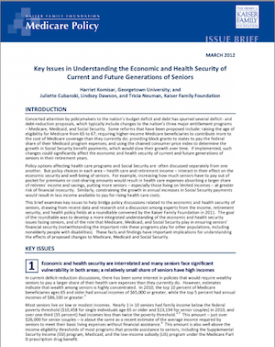Key Issues in Understanding the Economic and Health Security of Current and Future Generations of Seniors
Resource type: Research Report
Kaiser Family Foundation |
As policymakers seek to reduce the nation’s budget deficit by making changes to Medicare, Medicaid and Social Security these discussions fail to consider how choices in each area interact and affect the economic security of seniors, according to an issue brief by the Kaiser Family Foundation.
For example, increasing how much seniors must pay for premiums under Medicare would result in health care expenses absorbing a larger share of retirees’ income and savings, putting them at greater financial risk. Similarly, constraining the growth in annual Social Security payments would mean less income available to pay for health care costs. Such changes would also disproportionately affect seniors with low-to-moderate incomes, who are more likely to be women, black and Hispanic.
When policymakers consider options to decrease spending on entitlement programs, they should take into account the overall effects of proposals on seniors’ ability to pay for needed health care and essential living expenses, the authors state. The issue brief is based on a 2011 roundtable convened by Kaiser of experts from the income, retirement security and health policy fields.
The Kaiser Family Foundation is an Atlantic grantee under our Ageing programme in the United States.
